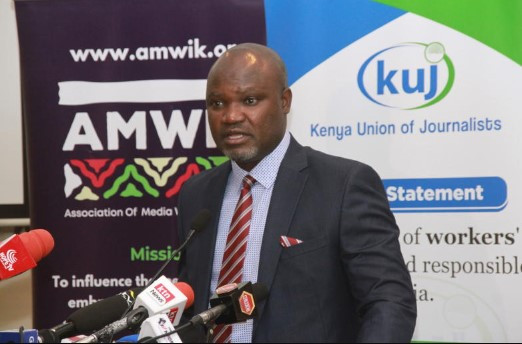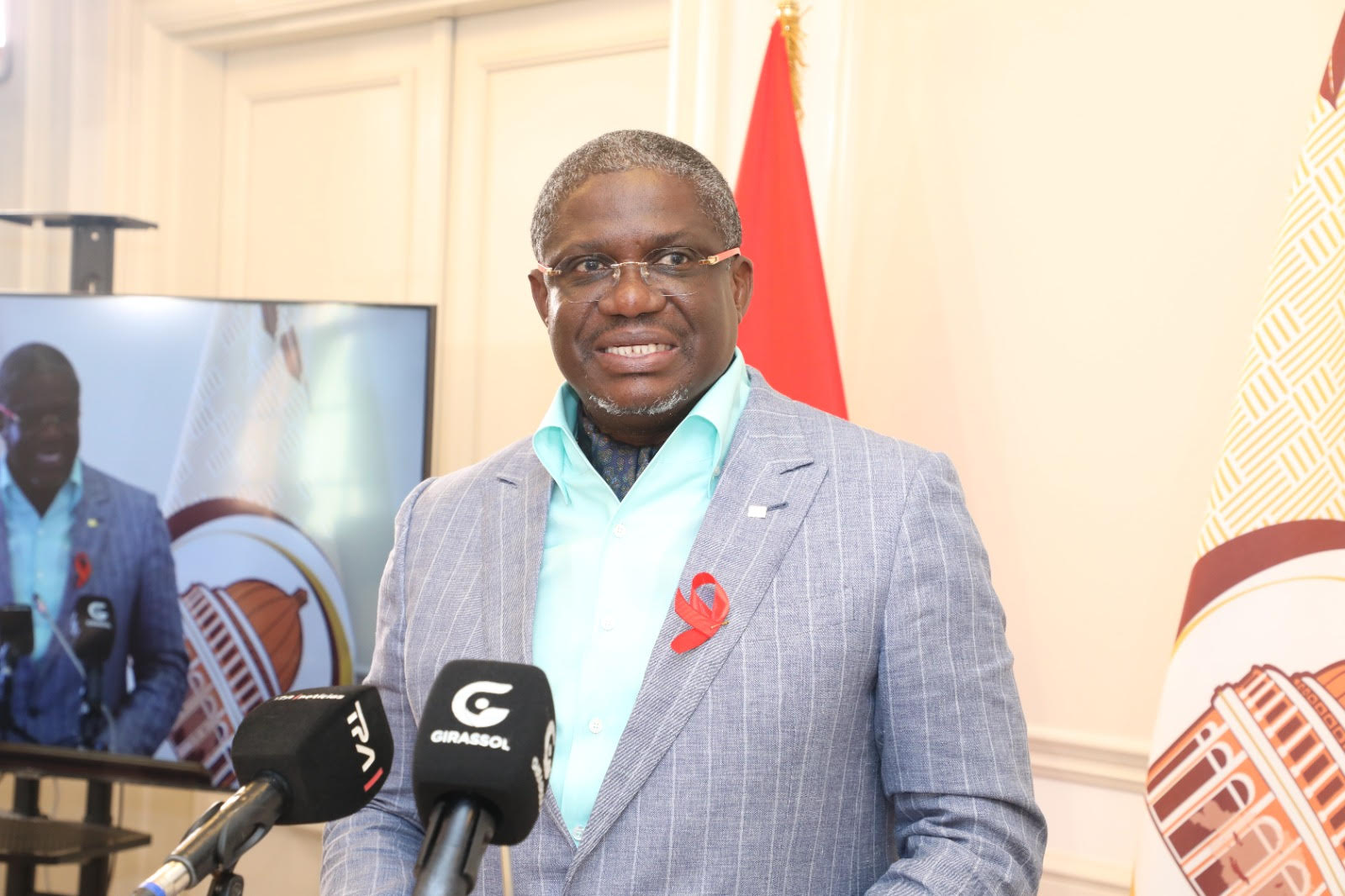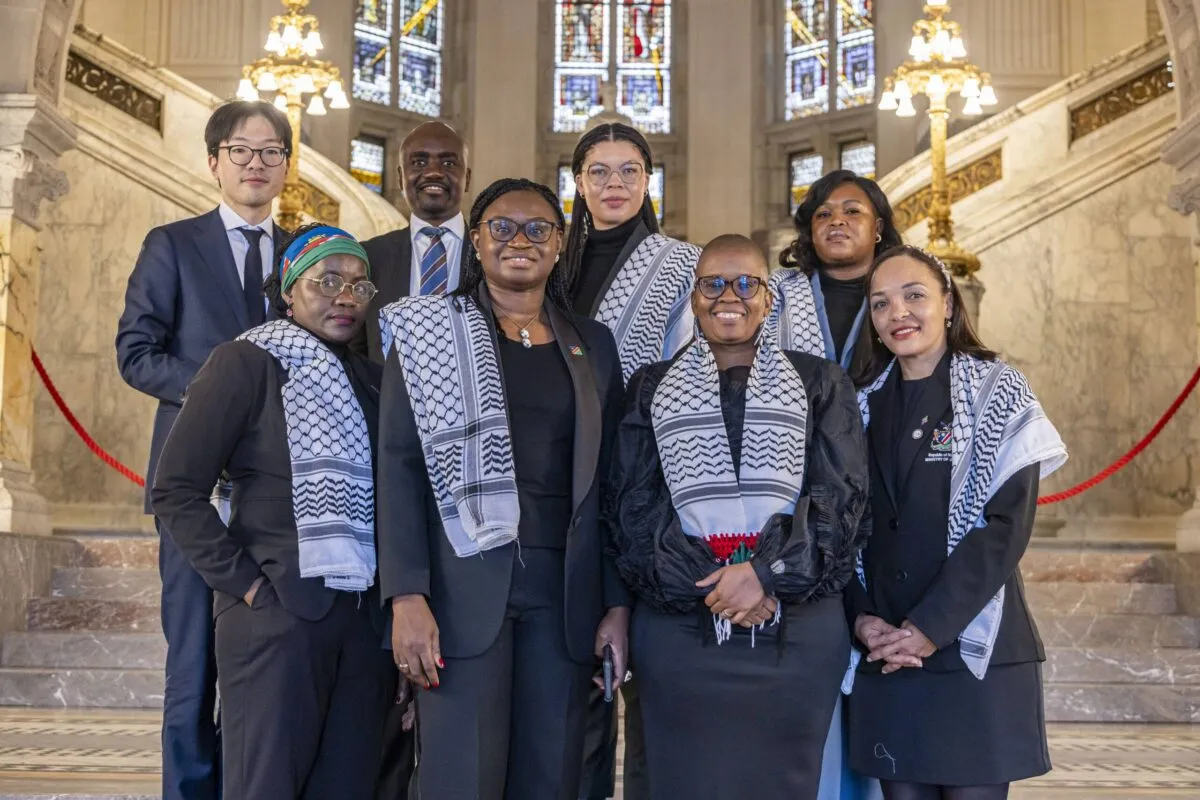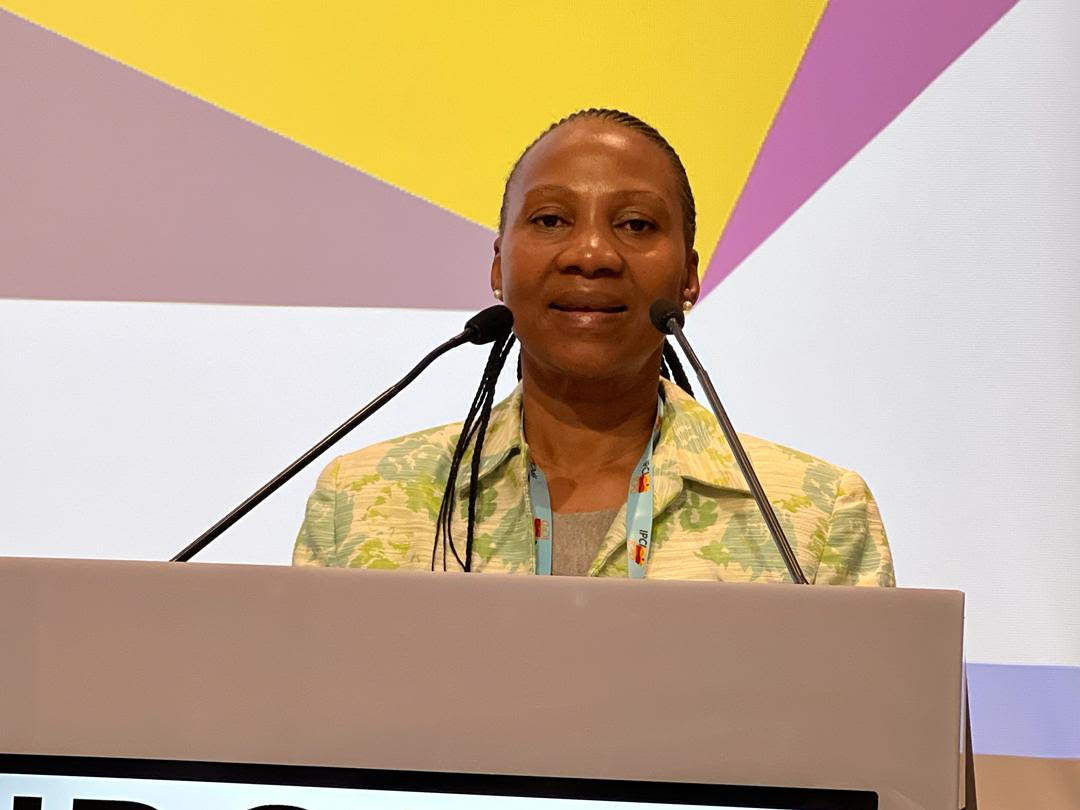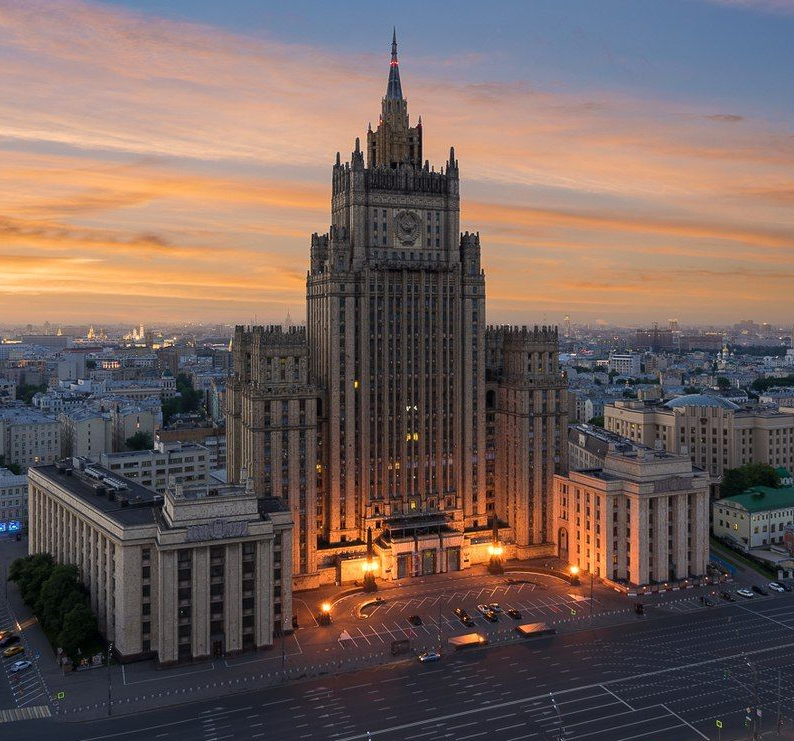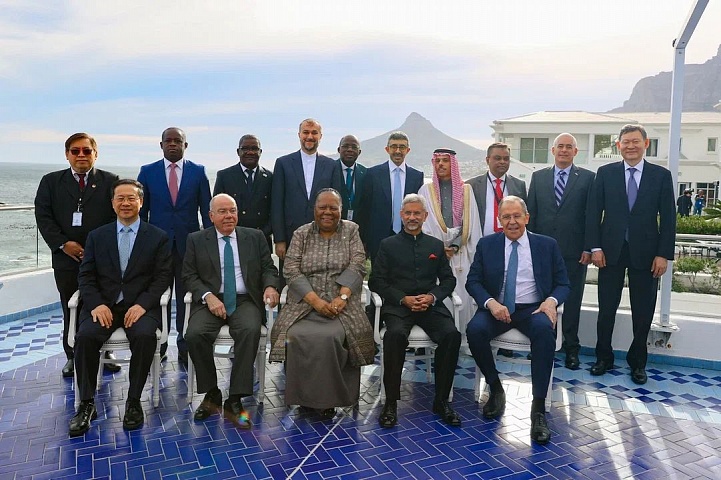
China's Vice Foreign Minister Ma Zhaoxu, Brazil's Foreign Minister Mauro Vieira, South Africa's Naledi Pandor, India's Subrahmanyam Jaishankar and Russia's Sergey Lavrov (Pic Russian Foreign Ministry)
The Pan Afrikanist Watchman
The world is rapidly changing right before our eyes, with the gradual collapse of the unipolar system giving way to a polycentric world order.
And at the heart of the new order is the emergence of BRICS, and association that has proven to be an example of “genuine multilateralism”, which is inclusive, universal and non-discriminatory.

This is the message that Russia’s foreign minister Sergey Lavrov took to Kenya and Burundi culminating in his speech on June 1, 2003 to the BRICS foreign ministers in Cape Town, South Adfrica.
Lavrov highlighted that the group of five nations (Brazil, Russia, India, China and South Africa) continues to form its cooperation based on mutual respect, the principles of openness, pragmatism and solidarity, as well as consensus and continuity.
Turning to the changing times, the Russian foreign minister observed that the countries of Asia, Africa and Latin America are strengthening their economic positions and showing their commitment and readiness to uphold their sovereign national interests and to play an equal role in global processes.
He said that a more just polycentric international order is taking shape at an increasingly fast pace. The unipolar system that used to create privileges for a small group of countries by way of imposing on all others unspecified rules and standards that stem from their selfish interests and ignore the fundamental principles of international law is on track to become a thing of the past.
The hegemonism and one-sidedness that continue to impact the Global South and the Global East are still rife. The West is using sanctions and financial blackmail to coerce sovereign nations into choosing specific economic models and trading partners thus limiting their potential.
The attempts to put an ideological slant on international discussions and multilateral institutions continue unabated. As a result, matters that have a special sense of urgency for the international community, such as overcoming the global economic crisis, ensuring sustainable economic growth, coordinating the reform of the international monetary, financial and trade systems with consideration for the interests of the global majority, are not being addressed.
These neo-colonial approaches and practices that are steeped in the desire to live at the expense of others have the most negative impact on communication between countries and are untenable in today’s world.
“I am convinced that, given the circumstances, the role of BRICS in helping resolve global problems should increase, especially so since our association remains an example of genuine multilateralism, which is inclusive, universal and non-discriminatory”, Lavrov said.
He warned that with the West doing what it’s doing, “our countries” and all the countries from the Global Majority must spare no effort as they continue to look for universal common answers to the challenges of our time.
These challenges include attempts to undermine the foundations of collective, equal and indivisible security, regional conflicts, international terrorism, and transnational crime, including the criminal use of the latest technology.
In this regard, Lavrov said they welcome the idea of holding a separate session in the Friends of BRICS format as part of the Foreign Ministers Meeting, where “we will invite our partners from like-minded countries.
“I believe that while we are in Cape Town we should compare notes on these issues and the intra-BRICS agenda, primarily with regard to expanding our association.
“We hope that the statement agreed upon by the Sherpas which will be adopted following our meeting will serve as a weighty contribution to drafting a declaration by the BRICS leaders in Johannesburg in August”, he said.
Also in attendance were the Foreign Ministers of South Africa, Naledi Pandor, India, Subrahmanyam Jaishankar; Brazil, Mauro Vieira and China’s Vice Foreign Minister Ma Zhaoxu.
Iran’s Foreign Minister, Hossein Amir-Abdollahian, and his Saudi counterpart, Prince Faisal bin Farhan Al Saud also participated in the BRICS meeting.
Their two countries, along with Venezuela, Argentina, Algeria and the United Arab Emirates are among those that have either formally applied to join BRICS or expressed interest.
At the end of the two-day meeting the Foreign Ministers produced a joint statement which they hope to reduce into a Declaration to be adopted by the Heads of State Summit planned for August 2023 in South Africa.
Joint Statement of the BRICS Ministers of Foreign Affairs and International Relations, Cape Town, South Africa, 1 June 2023
1. The BRICS Ministers of Foreign Affairs and International Relations met on 1 June 2023 in Cape Town, South Africa. They exchanged views on major global and regional trends and issues. They reaffirmed their commitment to strengthening the framework of BRICS cooperation under the three pillars of political and security, economic and financial, and cultural and people-to-people cooperation upholding the BRICS spirit featuring mutual respect and understanding, equality, solidarity, openness, inclusiveness, and consensus.
2. The Ministers reiterated their commitment to strengthening multilateralism and upholding international law, including the purposes and principles enshrined in the Charter of the United Nations (UN) as its indispensable cornerstone, and the central role of the UN in an international system in which sovereign states cooperate to maintain peace and security, advance sustainable development, ensure the promotion and protection of democracy, human rights and fundamental freedoms for all, and promoting cooperation based on the spirit of solidarity, mutual respect, justice and equality.
3. The Ministers expressed concern about the use of unilateral coercive measures, which are incompatible with the principles of the Charter of the UN and produce negative effects notably in the developing world. They reiterated their commitment to enhancing and improving global governance by promoting a more agile, effective, efficient, representative and accountable international and multilateral system.
4. The Ministers recalled UN General Assembly (UNGA) Resolution 75/1 and reiterated the call for reforms of the principal organs of the United Nations. They recommitted to instil new life in the discussions on reform of the UN Security Council (UNSC) and continue the work to revitalise the General Assembly and strengthen the Economic and Social Council. They recalled the 2005 World Summit Outcome document and reaffirmed the need for a comprehensive reform of the UN, including its Security Council, with a view to making it more representative, effective and efficient, and to increase the representation of the developing countries so that it can adequately respond to global challenges. China and Russia reiterated the importance they attach to the status and role of Brazil, India and South Africa in international affairs and supported their aspiration to play a greater role in the UN.
5. The Ministers reaffirmed the importance of the G20 to continue playing the role of the premier multilateral forum in the field of economic cooperation that comprises both developed and developing countries where major economies jointly seek solutions to global challenges. They looked forward to the successful hosting of the 18th G20 Summit under the Indian G20 Presidency. They noted the opportunities to build sustained momentum for change by India, Brazil and South Africa chairing the G20 from 2023 to 2025 and expressed support for continuity and collaboration in their G20 presidencies and wish them all success in their endeavours.
6. The Ministers called for the implementation of the 2030 Agenda for Sustainable Development in its three dimensions – economic, social and environmental – in a balanced and integrated manner by mobilising the means required to implement the 2030 Agenda. They highlighted in this regard that the Sustainable Development Goals (SDGs) Summit, to be held in New York in September 2023, constitutes a unique opportunity for renewing international commitment to the implementation of the 2030 Agenda.
7. The Ministers recognised the impact on the world economy from unilateral approaches in breach of international law and they also noted that the situation is complicated further by unilateral economic coercive measures, such as sanctions, boycotts, embargoes and blockades.
8. The Ministers expressed their support for the free, open, transparent, fair, predictable, inclusive, equitable, non-discriminatory and rules-based multilateral trading system with the World Trade Organisation (WTO) at its core, with special and differential treatment (S&DT) for developing countries, including Least Developed Countries. They stressed their support to work towards positive and meaningful outcomes on the issues at the 13th Ministerial Conference (MC13). They committed to engage constructively to pursue the necessary WTO reform with a view to presenting concrete deliverables to MC13. They called for the restoration of a fully and well-functioning dispute settlement system accessible to all members by 2024, and the selection of new Appellate Body Members without further delay. They condemned unilateral protectionist measures under the pretext of environmental concerns such as unilateral and discriminatory carbon border adjustment mechanisms, taxes and other measures.
9. They supported a robust Global Financial Safety Net with a quota-based and adequately resourced International Monetary Fund (IMF) at its centre. They called on continuing the process of IMF governance reform under the 16th General Review of Quotas, including a new quota formula as a guide, to be completed by 15 December 2023.
10. The Ministers congratulated Ms Dilma Rousseff, former President of the Federative Republic of Brazil, as President of the New Development Bank (NDB) and expressed confidence that it will contribute to strengthening the NDB in effectively achieving its mandate. They encouraged the NDB to follow the member-led and demand-driven principle, mobilise financing from diversified sources, enhance innovation and knowledge exchange, assist member countries in achieving the SDGs and further improve efficiency and effectiveness to fulfil its mandate, aiming to be a premier multilateral development institution.
11. The Ministers emphasised the importance of financial inclusion so that citizens can reap the benefits of economic growth and prosperity and welcomed the many new technological instruments for financial inclusion, developed in BRICS countries, that can contribute to ensuring the citizens full participation in the formal economy.
12. Ministers underscored the importance of encouraging the use of local currencies in international trade and financial transactions between BRICS as well as their trading partners.
13. The Ministers emphasised that ensuring energy security is a crucial foundation for economic development, social stability, national security, and the welfare of all nations worldwide. They called for resilient global supply chains and predictable, stable energy demand to ensure universal access to affordable, reliable, sustainable, and modern energy sources. They also stressed the importance of enhancing energy security and market stability by strengthening value chains, promoting open, transparent, and competitive markets, and ensuring the protection of critical energy infrastructure. They strongly condemned all terrorist attacks against critical infrastructure, including critical energy facilities, and against other vulnerable targets.
14. The Ministers reiterated that the objectives, principles and provisions of the United Nations Framework Convention on Climate Change (UNFCCC) and its Paris Agreement, in particular the principles of common but differentiated responsibilities and respective capabilities (CBDR-RC) in the light of different national circumstances, must be honoured. They reaffirmed their national and joint efforts to promote implementation of the Paris Agreement. In this regard, they stressed the importance of the fulfilment by developed countries of their commitments to provide technology and adequate, predictable, timely, new and additional climate finance that is long overdue to assist developing countries to address climate change. They expressed concern that the goal of developed countries to jointly mobilise USD 100 billion per year by 2020, and annually through 2025, has not been achieved and urged developed countries to meet their commitments. They rejected attempts to link security with the climate change agenda and recalled that the UNFCCC, including the annual Conference of the Parties (COP) sessions, is the appropriate and legitimate international forum to discuss the issue of climate change in all its dimensions.
15. The Ministers emphasised their determination to contribute to a successful COP28 in Dubai, later this year, with the focus on implementation. As the main mechanism for promoting implementation and climate action on all aspects of the Paris Agreement under the UNFCCC, the Global Stocktake must be effective in assessing and identifying implementation gaps on the global response to climate change, whilst prospectively laying the foundations for enhanced ambition by all, in particular by developed countries, and for the fulfilment of outstanding gaps in means of implementation for mitigation and adaptation actions in developing countries.
16. The Ministers welcomed Brazil’s candidacy to host COP30 as the year 2025 will be key to the very future of the global response to climate change.
17. The Ministers recognised the importance of the inclusion of women in peace processes including in conflict prevention and resolution, peacebuilding, post-conflict reconstruction and development, and sustaining peace.
18. The Ministers recalled their national positions concerning the situation in and around Ukraine as expressed at the appropriate fora, including the UNSC and UNGA. They noted with appreciation relevant proposals of mediation and good offices aimed at peaceful resolution of the conflict through dialogue and diplomacy. They called for the full and effective implementation of both the Black Sea Grain Initiative and the Memorandum of Understanding between the Russian Federation and the Secretariat of the United Nations on promoting Russian food products and fertilizers to the world markets and stress the importance of allowing grains and fertilisers to continue to reach those most in need.
19. The Ministers expressed serious concern over continued conflicts in the Middle East and North Africa (MENA) region and endorsed the Joint Statement by BRICS Deputy Foreign Ministers and Special Envoys at their meeting of 26 April 2023.
20. The Ministers welcomed the readmission of the Syrian Arab Republic to the League of Arab States on 7 May 2023 and reaffirmed their support to all efforts conductive to a political and negotiated solution that respects Syrian sovereignty and territorial integrity.
21. The Ministers expressed concern about the outbreak of violence in Sudan. They urged the immediate cessation of hostilities and they called for the unimpeded access of the Sudanese population to humanitarian assistance. They welcomed the efforts of the African Union, the Intergovernmental Authority for Development, the League of Arab States, the United Nations and its Security Council in seeking solutions for the ongoing crisis. They further welcomed support rendered by various countries, international organisations and agencies in the evacuation of foreign citizens from Sudan.
22. The Ministers expressed strong condemnation of terrorism in all its forms and manifestations whenever, wherever and by whomsoever committed. They recognised the threat emanating from terrorism, extremism conducive to terrorism and radicalisation. They are committed to combating terrorism in all its forms and manifestations, including the cross-border movement of terrorists, and terrorism financing networks and safe havens. They reiterated that terrorism should not be associated with any religion, nationality, civilisation or ethnic group. They reaffirmed their unwavering commitment to contribute further to the global efforts of preventing and countering the threat of terrorism on the basis of respect for international law, in particular the Charter of the United Nations, and human rights, emphasising that States have the primary responsibility in combating terrorism with the United Nations continuing to play central and coordinating role in this area. They also stressed the need for a comprehensive approach of the whole international community to effectively curb the terrorist activities, which pose a serious threat, including in the present-day pandemic environment. The Ministers rejected double standards in countering terrorism and extremism conducive to terrorism. The Ministers called for an expeditious finalisation and adoption of the Comprehensive Convention on International Terrorism within the UN framework and for launching multilateral negotiations on an international convention for the suppression of acts of chemical and biological terrorism, at the Conference of Disarmament. They welcomed the activities of the BRICS Counter-Terrorism Working Group and its five Subgroups based upon the BRICS Counter-Terrorism Strategy and the BRICS Counter-Terrorism Action Plan. We also look forward to further deepening counter-terrorism cooperation.
23. They expressed the need to comprehensively strengthen mechanisms for countering the increased use, in a globalised society, by terrorists and their supporters of emerging and evolving technologies such as Unmanned Aerial Systems, the Internet and other information and communications technologies, including social media platforms, for terrorist purposes, such as for recruitment and incitement to commit terrorist acts, as well as for the financing, planning, and preparation of their activities.
24. The Ministers called for strengthening the system of arms control, disarmament and non-proliferation, including the Convention on the Prohibition of the Development, Production and Stockpiling of Bacteriological (Biological) and Toxin Weapons and on their Destruction (BTWC) and the Convention on the Prohibition of the Development, Production, Stockpiling and Use of Chemical Weapons and on Their Destruction (CWC), and for preserving their integrity and effectiveness to maintain global stability and international peace and security. They underlined the need to comply with and strengthen the BTWC, including by adopting a legally binding Protocol to the Convention that provides for, inter alia, an efficient verification mechanism. The Ministers reasserted their support for ensuring the long-term sustainability of outer space activities and prevention of an arms race in outer space (PAROS) and of its weaponization, including through negotiations to adopt a relevant legally binding multilateral instrument. They recognised the value of the updated Draft Treaty on the Prevention of the Placement of Weapons in Outer Space, the Threat or Use of Force against Outer Space Objects (PPWT) submitted to the Conference on Disarmament in 2014. They stressed that practical Transparency and Confidence-Building Measures (TCBMs), may also contribute to PAROS.
25. The Ministers, while emphasising the formidable potential of the ICTs for growth and development, recognised new associated possibilities they bring for criminal activities and threats, and expressed concern over the rising level and complexity of criminal misuse of ICTs. They welcomed the ongoing work in the Ad Hoc Committee to elaborate a comprehensive international convention on countering the use of ICTs for criminal purposes and reaffirmed their commitment to cooperating in the implementation of the mandate adopted by the UN General Assembly resolution 75/282 in a timely manner.
26. In line with paragraph 57 of the Beijing Declaration, the Ministers emphasised the responsible and ethical development and use of Artificial Intelligence (AI) for socio-economic development and inclusive growth of all societies. They supported communication and cooperation on AI technology to promote mutual benefits, called for strengthening AI international governance and encourage policy exchanges and dialogues on AI, with a view to exploring to establish an effective global governance framework with the aim to protect human rights and spur innovation and economic growth.
27. The Ministers reiterated the need for all countries to cooperate in promoting and protecting human rights and fundamental freedoms under the principles of equality and mutual respect. They agreed to continue to treat all human rights, including the right to development, in a fair and equal manner, on the same footing and with the same emphasis. They agreed to strengthen cooperation on issues of common interests both within BRICS and in multilateral fora including the United Nations General Assembly and Human Rights Council, taking into account the necessity to promote, protect and fulfil human rights in a non-selective, non-politicised and constructive manner and without double standards.
28. The Ministers noted the Chair’s internal report on BRICS Institutional Development in line with paragraphs 71 to 73 of the Beijing Declaration.
29. The Ministers welcomed the Friends of BRICS Foreign Ministers meeting on 2 June 2023.
30. The Ministers expressed their full support to South Africa’s BRICS Chairmanship in 2023 under the theme “BRICS and Africa: Partnership for Mutually Accelerated Growth, Sustainable Development, and Inclusive Multilateralism”. They expressed their commitment to working together to ensure the success of the XV BRICS Summit. The Ministers looked forward to the next BRICS Ministers of Foreign Affairs and International Relations meeting to be held on the margins of UNGA78 and hosted by the Russian Federation as incoming Chair of BRICS in 2024.
(C) TPA

